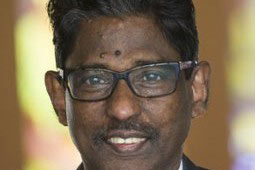Peter Vethanayagamony’s guiding principles in practice

“I’m so grateful for Christian missions and missionaries,” said Peter Vethanayagamony (2000, ThM; 2006, PhD), professor of Modern Church History. Vethanayagamony’s positive life-altering experience with services (i.e. education, health, discipleship) of Christian missionaries in India during his formative years stands in direct contrast to what he calls the American “guilt complex” about Christian missions.
It’s a contradiction that encouraged him to pursue the topic areas of missiology in his own scholarly work. “I wanted to acknowledge and appreciate what Christian missionaries had done to liberate the marginalized communities in India,” he said.
Those interests and corresponding scholarly pursuits began in India, at Serampore University (BTh), and later United Theological College (BD, MTh), Annamali University (BEd), Osmani University (MA) and Annamalai University (MA). It was during his studies in India that Vethanayagamony first became aware of LSTC.
“A number of my contemporaries and my friends came over here and they all told me, ‘There may be a Harvard, a Yale, and a Princeton, but LSTC is a place where you can go to get a very competitive education for a very affordable price,’ so that really motivated me to come here,” Vethanayagamony said. So, in 1998, he made the journey and embarked on a new adventure.
One of the greatest gifts of attending LSTC, Vethanayagamony said, was the ability to take classes at other seminaries and build lasting relationships with professors and students from the Chicago Theological Seminary, McCormick Theological Seminary, and Catholic Theological Union, among other institutions. “When I wrote my dissertation I had faculty members from neighboring schools on my committee, and that’s such a blessing,” Vethanayagamony said.
While his time at LSTC allowed him to refine his research interests and hone-in on topic areas that he pursues even now, it also prepared him for a career as an academic, teaching and mentoring other students.
“My guiding principle as a teacher today has to do with relevance,” Vethanayagamony said. “We all want to know what happened in the past and what is the relevance of them for us today. What are the ministerial and personal implications so that when we learn about the past, we can apply what we learn to the present?” Those questions are foundational, he believes, to developing a strong, student-centered pedagogical approach that can inform a variety of pastoral and academic settings.
For Vethanayagamony, mentorship is also critical to his work as a professor. “I started theological education almost 40 years ago,” he said. “Even now some of my students back in India are in touch with me. … when I see someone thriving in their ministry or thriving in their educational career, I think, ‘this is a worthwhile investment.’”
To students who are interested in building a life in academia and as a professor, Vethanayagamony has some words of encouragement: “In theological education, you’re impacting people … [and] your research and publications are going to speak to generations to come. Though you might be gone from this world, your voice will speak through your writing, so you live even after you’re gone.”
By Rhiannon Koehler, a writer, editor and content director in Chicago.